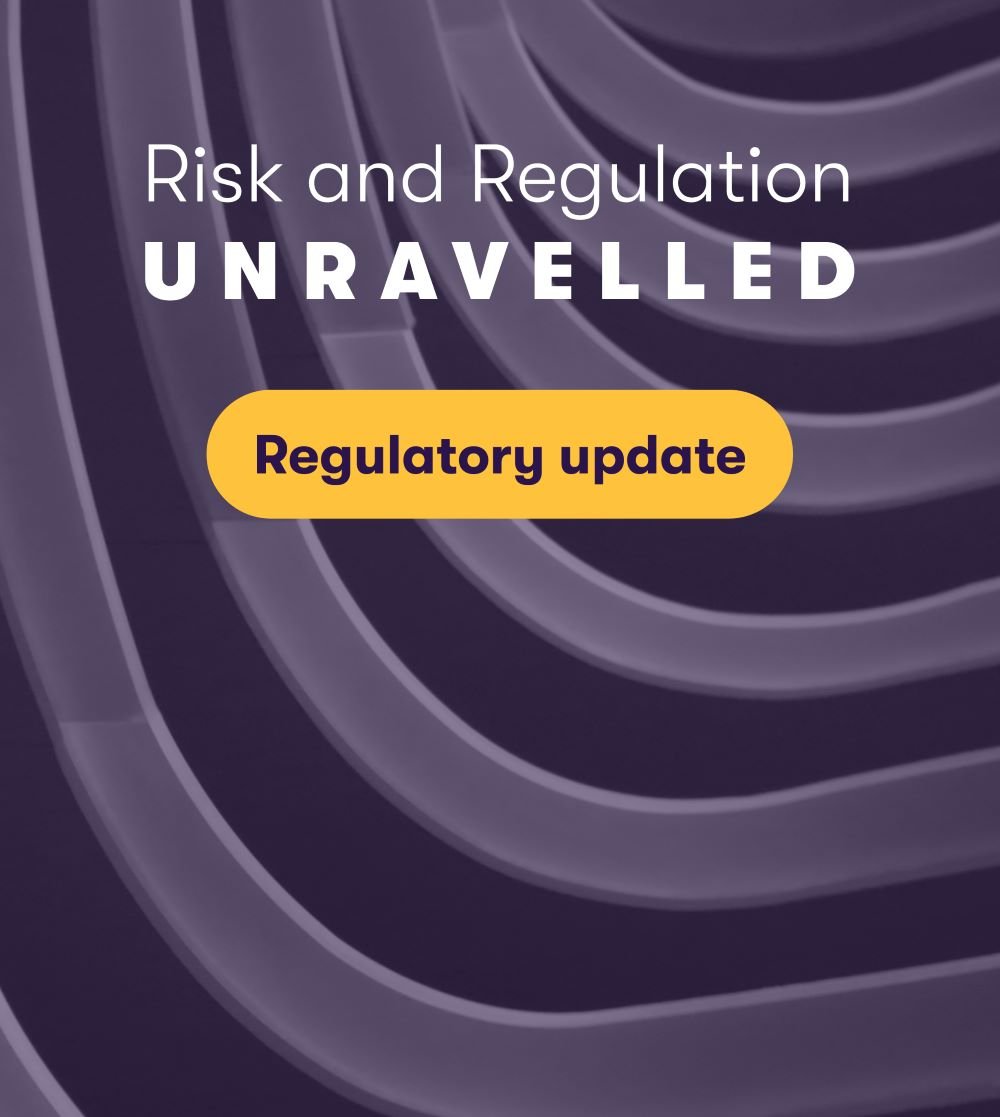This week, as part of its simplification drive, the Financial Conduct Authority (FCA) has confirmed its intention to publish in short order nine new sector‑specific reports covering ‘Regulatory Priorities’ for 2026, replacing its previous portfolio letters. These reports aim to provide a more transparent view of where the regulator will focus its attention; helping firms sharpen governance, strengthen oversight and prepare for evolving risks. In its first report, focus areas for the insurance sector include claims handling, broadening access and engaging actively with innovation initiatives.
Elsewhere, the Prudential Regulation Authority (PRA) has confirmed changes to credit union investment rules and opened consultations on both the Overseas Prudential Requirements Regime (OPRR) and an overhaul of the UK securitisation requirements. Finally, HM Treasury’s (HMT) latest call for evidence signals a potential tightening of UK sanctions regulations.
FCA sector priorities for 2026
The FCA has announced its intention to publish nine annual Regulatory Priorities reports over the coming weeks, replacing its previous portfolio letters. These reports provide firms across insurance, consumer investments, pensions, retail banking, mortgages, consumer finance, wholesale markets, and payments with greater clarity regarding the regulator’s main areas of focus. The revised framework is intended to foster improved compliance, promote innovation, and deliver better outcomes for consumers. Each sector will receive a tailored overview of risks and proposed regulatory activities for the coming year, allowing firms to determine which priorities are relevant to their business models and whether additional linked reports should be considered. The FCA notes that its workplan may be adapted throughout the year in response to market developments or emerging risks.
For its initial report covering the insurance sector, the FCA’s Regulatory Priorities call for firms to enhance claims handling, improve consumer comprehension, broaden access to cover, champion innovation, and simplify regulations. The regulator’s agenda includes:
- Addressing poor claims experiences, particularly in home and travel insurance
- Reviewing oversight of outsourced claims, and
- Assessing how sales processes affect outcomes.
The ongoing Motor Total Loss initiative is expected to secure compensation for roughly 270,000 drivers. The regulator expects insurers to also monitor outcomes and demonstrate that products deliver on their promises.
Widening access to insurance remains a priority. The FCA will collaborate with industry on inclusion initiatives, such as expanding home contents cover for social renters and ensuring equitable decisions for consumers with mental health conditions. It will continue to monitor premium finance. Innovation and streamlining are also key themes, with firms encouraged to pilot new solutions, participate in the AI Lab and sandbox, and engage in consultations on captive insurance and the removal of unnecessary regulation.
Read more on the new Regulatory Priorities reports
Read more on the Regulatory Priorities: Insurance report
Credit union investment rules updated
The PRA has confirmed new rules that widen how credit unions can invest in Credit Union Service Organisations (CUSOs). The changes took effect on 20 February 2026, with new supervisory expectations applying from 20 August 2026. The PRA has increased the investment cap from 5 percent to 7.5 percent of capital and will now permit investment in CUSOs that also support other UK regulated mutuals. Credit unions may also partner with non‑credit union owners, provided they meet new expectations on due diligence, governance and conflict management.
Key takeaways for senior managers, compliance and risk teams are clear. The higher cap allows more meaningful participation in shared service models. Broader eligibility and ownership structures support collaboration with innovators. The PRA has introduced safeguards, including legal and operational separation requirements and expectations for conflict-of-interest policies. These aim to manage exposure, given increased financial and step‑in risks.
Firms should review the updated SS2/23 and consider how the new 7.5 percent limit, partnership routes and prudential safeguards apply to their strategy. Credit unions have six months to implement the new expectations, so early assessment and planning will be important.
PRA sets out Overseas Prudential Requirements Regime rule changes
The PRA has opened consultation CP3/26 to update its Rulebook for the introduction of HMT’s OPRR. The changes aim to keep PRA rules aligned with the Treasury’s new approach to recognising overseas prudential regimes. The PRA expects the impact on firms to be minimal because the changes mainly restate existing equivalence provisions rather than introduce new requirements.
Key takeaways for senior managers and compliance and risk teams include the shift from EU Capital Requirements Regulation equivalence to a UK designation model, revised treatments for exposures to overseas institutions, and updates to the rules for covered bonds, sovereign exposures and large exposures. The PRA proposes that exposures to institutions in non‑designated jurisdictions will be treated as corporate exposures under the standardised approach. It also plans minor amendments to large exposures rules, the treatment of covered bonds and the interaction of sovereign risk‑weighting with credit risk mitigation.
The PRA intends these changes to take effect on 1 January 2027 alongside Basel 3.1. The consultation closes on 2 April 2026.
Read more on CP3/26 PRA rule changes to accommodate HMT OPRR regime
PRA proposes overhaul of securitisation rules
The PRA has issued CP2/26, a wide package of proposals to simplify and rebalance the UK securitisation regime. The regulator aims to cut unnecessary prescription while keeping safeguards that support safety and soundness. The consultation runs until 18 May 2026 and implementation is expected for Q2 2027.
The paper proposes lighter due diligence for investors by removing detailed verification and monitoring rules and replacing them with proportionate outcomes‑based requirements. It introduces an ‘L‑Shaped’ risk retention option, combining vertical and first‑loss retention, to increase flexibility and align the UK with approaches used in other markets. Transparency and reporting rules would be streamlined, with many templates removed, the public versus private distinction dropped, and single‑loan transactions given tailored relief.
The PRA also plans targeted exemptions to the ban on securitisation, subject to safeguards, and clearer credit‑granting standards to avoid inconsistent interpretation. A new IRB treatment for single‑loan mortgage securitisations would allow firms to adjust loss‑given‑possession estimates so capital better reflects the economics of Mortgage Guarantee Scheme loans.
Read more on CP2/26 Reforms to securitisation requirements
HMT seeks views on sanctions
HMT has launched a call for evidence on how firms apply the control element of the ownership and control test in UK financial sanctions. The Treasury wants to understand whether the test’s hypothetical element, which captures situations where a designated person could exercise control if they chose to, is causing uncertainty, inconsistent outcomes or undue compliance cost.
The control test matters because it determines whether an entity is itself subject to an asset freeze. The Treasury notes that industry views this aspect of the legislation as broad and difficult to apply, especially where complex structures, trusts, proxies or cross‑border arrangements obscure influence. Firms also report concerns about strict liability, the risk of litigation and the potential need to de‑risk when evidence is unclear. At the same time, the government stresses the test aims to prevent circumvention and capture hidden influence.
The HMT seeks views on prevalence, implementation challenges, cost, evidence thresholds and whether published control typologies help. Firms may respond up to 13 April 2026.
Read more on HMT call for evidence
UK Regulatory Handbook 2026
An essential guide to the regulatory landscape for financial services



